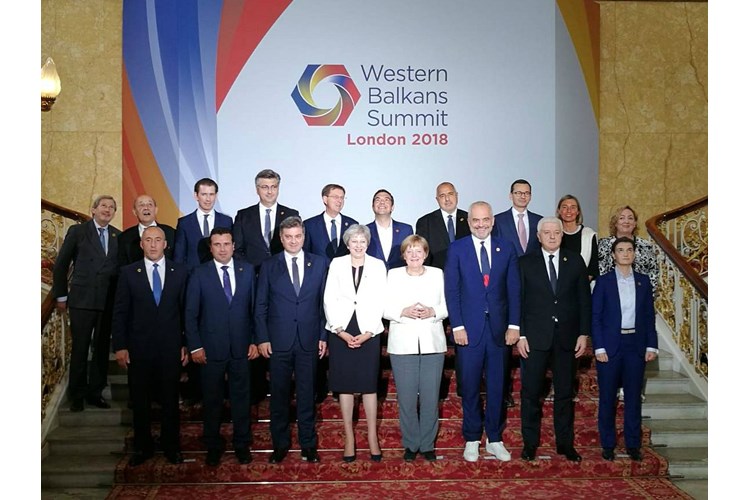


On the second day of the summit, the leaders of six Western Balkan countries and ten EU countries, including British Prime Minister Theresa May and German Chancellor Angela Merkel, discussed ways of strengthening economic and security cooperation between the EU and the region.
"The main topics we discussed were the economy, connectivity, cooperation in transport, better preparation of the Southeast European countries in the process of their accession to the European Union, and issues relating to security and migration," Plenkovic told Croatian media.
He said that the Berlin Process, as part of which the London summit is taking place, had provided additional impulse to EU-Western Balkans relations and "filled the gap" in institutional dialogue.
"During its presidency of the EU, Croatia wants to put the focus back on its neighbourhood, which is why this time too I announced a second summit for 2020 in the present constellation of leaders of the EU and the countries in the region," the Croatian PM said.
He recalled a summit that had been held in this format in Zagreb in 2000, one held in Thessaloniki in 2003 and the Sofia summit held a month and a half ago.
The Berlin Process was launched in 2014 by German Chancellor Merkel to encourage the Western Balkan countries to implement the necessary reforms and show that despite enlargement fatigue the EU kept its door open for all Southeast European countries that met the membership criteria.
The main objectives of the London summit are to strengthen economic stability in Southeast Europe by improving the business environment and regional inter-connectivity, strengthen regional security, including the fight against corruption, organised crime, trafficking in humans, drugs and firearms, terrorism and violent extremism, and facilitate political cooperation to accelerate the resolution of bilateral issues.
Cooperation in search for war missing, prosecution of war crimes agreed
Plenkovic said participants in the summit spent most of the time discussing ways to resolve certain bilateral issues that had burdened relations between the countries for a long time, mentioning specifically the agreement between Greece and Macedonia on the name dispute.
"This is the first major meeting after that agreement. In my address I welcomed the fact that at the summit in Brussels tomorrow NATO would invite Macedonia to join it. I believe that it is a good move, it is good for mutual relations and for the stability of Europe's entire southeast," said Plenkovic.
Also attending the London summit were Austrian Chancellor Sebastian Kurz, Serbian Prime Minister Ana Brnabic, Slovenian PM Miro Cerar, High Representative of the European Union for Foreign Affairs and Security Policy Federica Mogherini and Greek Prime Minister Alexis Tsipras.
Plenkovic said that a number of declarations had been signed at the summit pertaining to good-neighbourly relations, the search for the war missing and cooperation in the prosecution of war crimes.
"There is a very clear sentence (in the documents) on avoiding the conflict of jurisdiction. For Croatia, that means that Croatia is in charge of prosecuting all crimes that happened on its territory," he said.
He added that the summit also tackled the issue of migration, repeating that all non-EU members were expected to "follow EU policies, protection of the external borders, strengthening of national capacities, respect for all agreements on readmission and an effective exchange of information."
"As far as Croatia is concerned, the better we solve the matter on the Greek-Turkish border, the fewer problems we will all have," said Plenkovic.
Plenkovic, May talk about World Cup semifinal
Plenkovic confirmed that on Wednesday evening he would attend the World Cup semi-final match between Croatia and England in Moscow, noting that the success of the national football team was the best possible kind of promotion for the country.
Plenkovic talked about the match with his British counterpart Theresa May, and the two exchanged jerseys of their national teams.
Less than a year before Brexit and amid a crisis that is shaking the British government after the resignation of two ministers, by organising the summit on the Western Balkans British officials wanted to show that London wants to continue to be a partner to the EU after Britain's exit, notably in the field of security and the fight against terrorism and cross-border crime, and that it is strongly interested in Southeast Europe's stability and economic prosperity.
The summit was attended by six Balkan countries aspiring for EU membership - Albania, Bosnia and Herzegovina, Kosovo, Macedonia, Montenegro and Serbia; seven EU member states included in the Berlin Process - Austria, Croatia, France, Germany, Italy, Slovenia and Poland; Great Britain as the host; and EU members Bulgaria and Greece.
On the first day of the summit on Monday, a series of meetings of foreign and interior ministers were held, focusing on topics relating to the future of Southeast Europe. Special emphasis was placed on the issue of security and migration and on youth - and young leaders were able to present their ideas. Representatives of civil society organisations and start-ups were also given a chance to talk with ministers and present their ideas and views on the future development of the region.
This was the fifth annual summit after the first one was held in Berlin, followed by those in Vienna, Paris and Trieste. The next summit will be held in Poland.
After the formal talks are over, the participants are scheduled to attend a reception given by Prince Charles.
Plenkovic is expected to meet with representatives of the Croatian community in the UK in the Croatian Embassy.
Text: Hina